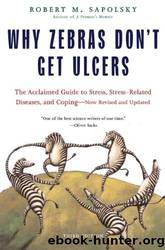Why Zebras Don't Get Ulcers by Robert M. Sapolsky

Author:Robert M. Sapolsky [Sapolsky, Robert M.]
Language: eng
Format: epub
Tags: Stress, Stress (Physiology), Health & Fitness, Psychology, Success, Stress; Psychological, Adaptation; Psychological, Stress (Psychology), General, Stress Management, Self-Help, Personal Growth, Healthy Living
ISBN: 9780805073690
Google: EI88oS_3fZEC
Publisher: Macmillan
Published: 2004-09-15T00:00:00+00:00
The Human Realm: A Cautionary Note
There are, by now, some fairly impressive and convincing studies linking human personality types with stress-related diseases. Probably the best place to start, however, is with a bit of caution about some reported links that, I suspect, should be taken with a grain of salt.
Iâve already noted some skepticism about early psychoanalytic theorizing that linked certain personality types with colitis (see chapter 5). Another example concerns miscarriages and abortions. Chapter 7 reviewed the mechanisms by which stress can cause the loss of a pregnancy, and one hardly needs to have experienced that personally to have an inkling of the trauma involved. Thus, you can imagine the particular agony for women who miscarry repeatedly, and the special state of misery for those who never get a medical explanation for the problemâno expert has a clue whatâs wrong. Into that breach have charged people who have attempted to uncover personality traits common to women labeled as âpsychogenic aborters.â
Some researchers have identified one subgroup of women with repeated âpsychogenicâ abortions (accounting for about half the cases) as being âretarded in their psychological development.â They are characterized as emotionally immature women, highly dependent on their husbands, who on some unconscious level view the impending arrival of the child as a threat to their own childlike relationship with their spouse. Another personality type identified, at the opposite extreme, are women who are characterized as being assertive and independent, who really donât want to have a child. Thus, a common theme in the two supposed profiles is an unconscious desire not to have the childâeither because of competition for the spouseâs attention or because of reluctance to cramp their independent lifestyles.
Many experts are skeptical about the studies behind these characterizations, however. The first reason harks back to a caveat I aired early in the book: a diagnosis of âpsychogenicâ anything (impotency, amenorrhea, abortion, and so on) is usually a diagnosis by exclusion. In other words, the physician canât find any disease or organic cause, and until one is discovered, the disorder gets tossed into the psychogenic bucket. This may mean that, legitimately, it is heavily explained by psychological variables, or it may simply mean that the relevant hormone, neurotransmitter, or genetic abnormality has not yet been discovered. Once it is discovered, the psychogenic disease is magically transformed into an organic problemââOh, it wasnât your personality after all.â The area of repeated aborting seems to be one that is rife with recent biological insightsâin other words, if so many of last decadeâs psychogenic aborters now have an organic explanation for their malady, that trend is likely to continue. So be skeptical of any current âpsychogenicâ label.
Another difficulty is that these studies are all retrospective in design: the researchers examine the personalities of women after they have had repeated abortions. A study may thus cite the case of a woman who has had three miscarriages in a row, noting that she is emotionally withdrawn and dependent on her husband. But because of the
Download
This site does not store any files on its server. We only index and link to content provided by other sites. Please contact the content providers to delete copyright contents if any and email us, we'll remove relevant links or contents immediately.
Men In Love by Nancy Friday(4344)
Everything Happens for a Reason by Kate Bowler(4076)
The Immortal Life of Henrietta Lacks by Rebecca Skloot(3834)
Why We Sleep by Matthew Walker(3782)
The Sports Rules Book by Human Kinetics(3598)
Not a Diet Book by James Smith(2744)
The Emperor of All Maladies: A Biography of Cancer by Siddhartha Mukherjee(2440)
Sapiens and Homo Deus by Yuval Noah Harari(2424)
Day by Elie Wiesel(2252)
Endless Forms Most Beautiful by Sean B. Carroll(2089)
Angels in America by Tony Kushner(2054)
A Burst of Light by Audre Lorde(1984)
Hashimoto's Protocol by Izabella Wentz PharmD(1904)
Dirty Genes by Ben Lynch(1863)
Reservoir 13 by Jon McGregor(1860)
Stretching to Stay Young by Jessica Matthews(1719)
Fat for Fuel by Joseph Mercola(1701)
The Immune System Recovery Plan by Susan Blum(1701)
Boost Your Brain Power in 60 Seconds by Michelle Schoffro Cook(1682)
